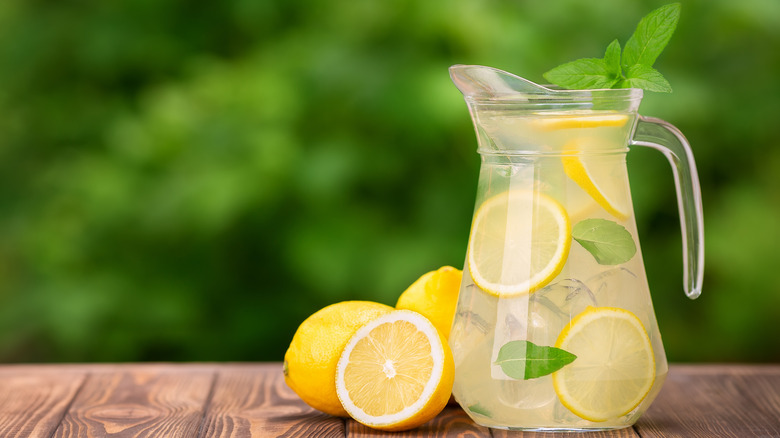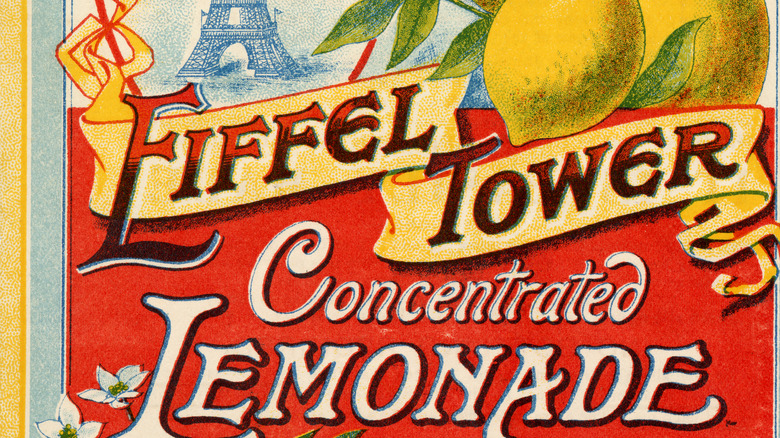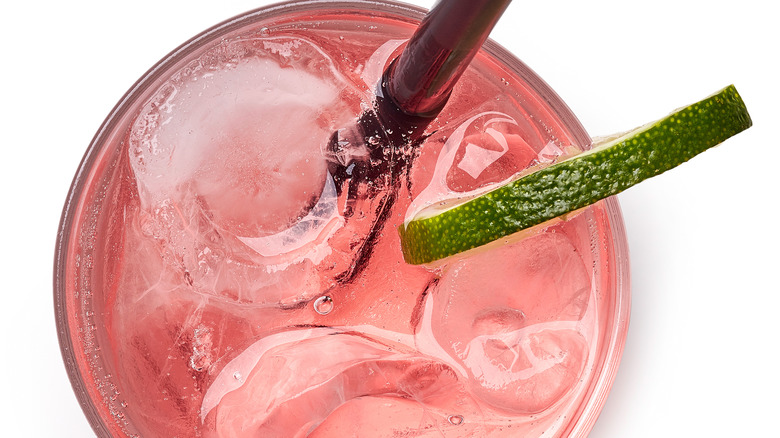Lemonade's Origin Story Probably Isn't What You Think
Lemonade — it's a summer staple for good reason: It cools us off, satisfies our thirst, and its sweet-tart combination is like a wake-up call to our sluggish senses when temperatures soar. Lemonade, at a basic level, is a marriage of lemon juice, sweetener, and water served cold. Did you ever wonder who invented it? Who, exactly, was the genius who first realized this was something we need in our lives?
Pinning down the origins of food and drink can be a daunting task since written records of cuisine are not always available (even though we know people did eat and drink something, whether or not we have evidence). Part of the challenge in figuring out where lemonade came from is the mysterious origin of the lemon itself. While we know that citrus fruits, in general, can be traced back to Southeast Asia more than 8 million years ago (per Nature) and that the citron has roots in India that had extended to Persia and Egypt by the fourth century B.C. (per ArteCibo), we're not quite sure when the juicier fruit we call a lemon comes into the picture. But like so many elements of civilization, if it didn't start in the fertile crescent between the Tigris and Euphrates, it probably has roots in Egypt.
Fragrant origins from kashkabs to limonadiers
We are fortunate to have evidence from the poet Nasir Khusraw and from medieval Jewish historians to point us in the direction of lemonade's source (per Mental Floss and Forgotten History). Records attest to the existence of a couple of different varieties of lemonade in Egypt, and documents refer to these beverages' existence as early as the 10th century, and to the first written recipe in the 13th. "Kashkab," the first reference we have, was a lemonade made from "a combination of fermented barley combined with mint, rue, black pepper and citron leaf" (via How Stuff Works). We can think of it as fragrant, spicy, hard lemonade — a bit like the flavored beer cocktails called shandies. Another early version of lemonade known as "Qatarzimat" is documented by historians as a favorite of the medieval Jewish community in Cairo and was even exported. This kind was a little more kid-friendly, consisting of simple sweetened lemon juice (although it, too, could be spiked, via Forgotten History).
The 17th century saw the enthusiasm for lemonade expand into Europe: French peddlers called "limonadiers" started selling lemon water mixed with honey, which they transported through the streets in tanks on their backs (per Mental Floss). The new beverage proved extremely popular from the get-go and may even have limited the spread of the plague as lemon peels contain a flea-killing substance called limonene, per "Food Fights and Culture Wars" author Tom Nealon (via How Stuff Works).
The American lemonade tradition: give them lemonade and circuses
Lemonade also found its way to the American colonies: Lemons grew well in the warm, humid climate of the southern U.S. (per Forgotten History) and nearby sugar cane plantations provided a ready and inexpensive supply of sweeteners, supplanting the honey used in European recipes. But it was the 19th-century temperance movement that really gave the lemonade business a boost. As concern over alcoholic consumption mounted, lemonade emerged as a wholesome alternative to the evils of drink. President Rutherford Hayes' wife Lucy even became known as "Lemonade Lucy" (per The White House) for her stand against spirits and in favor of lemonade.
The citrus beverage of choice was likewise a big seller at the circus, which is generally credited with the invention of pink lemonade. There are two versions of the story, neither of which involves red fruit. One is that red-hot candies fell into a vat of lemonade; the vendor decided to spin it and sell it anyway as "pink lemonade." It sold like hotcakes and a concession star was born (per Forgotten History). The other version is ... less pleasant. Out of fresh water, the vendor desperately asked a clown friend for help, but the only water available was in a bathtub used for rinsing clowns' red tights, and rather than limit his sales he used the pink water. Either way, pink lemonade persisted. Despite this potentially unsavory past, people around the world agree — lemonade is a definite keeper.


